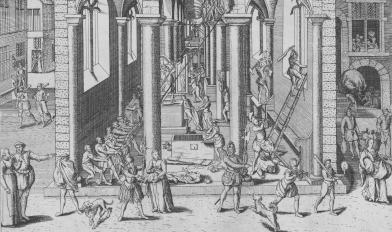Saying “be nice” is nothing like saying “be kind”. The two phrases are worlds apart.
First, consider how a British man living in Holland says the Dutch seem “rude” (to him the opposite of nice) because of what he deems an egalitarian approach (data sharing) to risk management.
The constant need to defend against flooding also had a profound impact: with one person’s land at risk if another failed to maintain their dikes, it was essential that decisions be made collectively.
That’s not really accurate. Armies have constant need to defend, yet decisions do not need to be made collectively. It wasn’t a need to defend against water that led to a Dutch “directness” against lying and cheating, also known as holding people accountable.
Others have tried to put a humorous spin on the real reasoning, related to a sense of justice and equality:
Apart from cheese and tulips, the main product of the country is advocaat, a drink made from lawyers.
A freedom to speak the truth or even just detect and document what is happening was a method to resist attempts at denial (non-repudiation), which were early integrity controls related to Dutch distaste for Spanish religion-based rule 1556 to 1581.
Calvinist religion had a large impact on national identity because the Dutch associated Catholicism with Spanish oppression. From that moment on, “Calvinism dictated the individual responsibility for moral salvage from the sinful world through introspection, total honesty, soberness, rejection of ‘pleasure’ as well as the ‘enjoyment’ of wealth,” writes Breukel in an article on Dutch business culture published on her website.
Everyone speaking their mind (a methodology of truth-seeking as offensive measures) enabled popular resistance to a form of top-down management where an autocrat could never be wrong (never be brought to justice by lawyers) because even the laws were autocratically controlled.
This is the philosophical split between a set of inherited rights versus controlled rights, an ancient ethics distinction which I often refer to in my talks about why artificial intelligence can be so unsafe.
The real product today of the Beeldenstorm of 1566 (Iconoclasm) is that the Dutch aren’t very religious.

The British by comparison tend to lean on the concept of being “rude” as a social enforcement mechanism.
Everyone in England is supposed to be trying to pull together on a collective goal (e.g. winning against adversaries, staying in a queue during WWI or WWII) as a different form of resistance to imposed authority. There’s actually less divergence between the two cultures than implied just because Holland dealt with Spanish inquisition while England… dealt with its own set of threats.
Second, while being “nice” is an act of self-erasure supposedly in the interest of others — whether society or a single authority — it’s the opposite of what’s being discussed above in terms of risk and information sharing. It’s literally a form of ignorance.
Nice didn’t always mean what it means today. “Nice” comes from the Latin nescius, which literally means, “not-knowing” (from ne, “not,” and scire, “to know.”) Even centuries later, when the word found its way into Middle English, that meaning more-or-less remained the same: “nice” still connoted ignorance. If you were “nice,” that meant you were simple, foolish, daft—an idiot.
This all begs the question whether people think of others in terms of an actual greater good (e.g. lowland flooding) or simply erasing themselves at the behest of random request to not have independent thoughts. Holland is the former and Texas is a great example of the latter (e.g. it’s not “nice” to talk about real history such as a racist state founded to perpetuate and expand slavery alone). Did you know in 1836 that America used an official “Gag rule” to deny Americans the right to speak the truth about slavery?
In fact, Texas and Florida history clearly shows they are states with a total lack of accountability and an idealized model of business profit and ascent to power. They are doing statewide what has been celebrated in popular American spectator events that reward niceness (lying) like NASCAR and Football. Being nice in America may mean peddling catchy “know nothing” ignorance as a means of privileged profit by doing harm to others, which also explains why the unkindness of “tipping” is still a thing.
In other words, if you desire to prevent power shifting to liars and cheats try to practice integrity (honesty) and be kind, even when it’s not nice (rude).